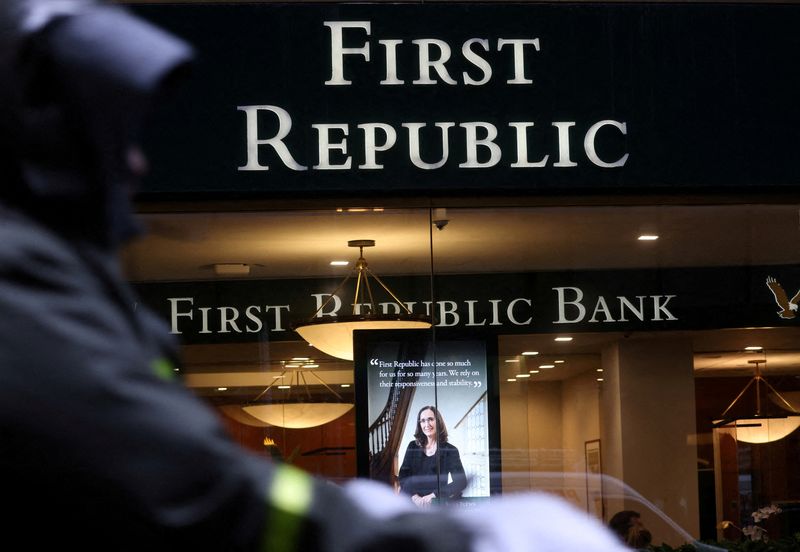By David French
NEW YORK (Reuters) - Some U.S. regional banks' efforts to raise capital and allay fears about their health are running up against concerns from potential buyers and investors about looming losses in their assets, five sources with knowledge of the discussions said.
First Republic Bank (NYSE:FRC) and PacWest Bancorp are among the banks that have been speaking to peers and investment firms about potential deals in the wake of U.S. regulators taking over Silicon Valley Bank and Signature Bank (NASDAQ:SBNY) this month amid a flight of depositors, sources have said.
First Republic's shares have fallen 80% since March 8, when the crisis started, while PacWest shares are down 65%.
First Republic declined comment. PacWest did not immediately respond to a request for comment.
The five sources, who work at or with major banks and private equity firms and examined such deals, told Reuters that they have decided not to participate for now for fear they could be hit with losses in the investment portfolios and loan books.
They requested anonymity because they were not authorized to discuss the confidential deliberations publicly.
The investment portfolios where the regional banks have parked the deposits of their clients comprise mainly Treasuries and other securities, such as mortgage bonds.
They are worth less than what the banks value them on their books because of a steep rise in interest rates. Some of the loan books of these banks are also underwater, due to high rates and concerns about an economic slowdown.
The sources said they were reluctant to participate in these deals without a government backstop on the losses or a more favorable outlook on interest rates.
Reuters could not determine whether any banking regulators had been asked by suitors to backstop the portfolio losses and whether they would do so.
The Federal Deposit Insurance Corporation (FDIC), which insures deposits and manages receiverships, told banks mulling offers in the auctions for Silicon Valley Bank and Signature Bank on Friday that it was considering retaining some of the assets that are underwater at the failed lenders. Such a backstop, however, is typically reserved for banks taken over by the FDIC.
An FDIC spokesperson did not respond to a request for comment.
LARGE LOSSES
Credit ratings agency Moody's (NYSE:MCO) Investors Service Inc estimated on Friday that unrealized losses on First Republic's investment portfolio represented 37.7% of the cash and stock it set aside to absorb losses and warned it would also be difficult to sell some of its residential mortgage loans without a loss.
"Such a crystallization of losses, if it were to happen, would very materially weigh on the bank's profitability and capital," Moody's said.
One banking executive who studied a deal with First Republic estimated that marking-to-market the California-based bank's mortgage book in an acquisition would spell a large hit for the acquirer.
The government would have to facilitate such a deal, the executive said. It could do so by providing some leeway to the acquirer's leverage ratios that determine the bank's debt levels, or backstop it in other ways, the executive added. The executive was not aware of any such discussions.
Another complication in cutting a deal with regional banks is the uncertainty over the interest rate outlook, said a lawyer who works on transactions involving banks.
The Federal Reserve will decide on Wednesday whether it will raise rates further in its battle against inflation. Those studying deals and trying to assess the future value of regional banks are hoping for clarity on how aggressively the central bank will move to raise rates further, the lawyer said.
MUDDLING THROUGH
It is unclear how long some regional banks can muddle through without a deal.
While new liquidity backstops created by the U.S. Treasury and regulators last Sunday are keeping the regional banks afloat, the crisis has eviscerated their profitability and made it difficult to continue with business as usual, banking analysts say.
Bank of America (NYSE:BAC) analysts wrote in a research note on Friday that the $30 billion in deposits that First Republic's major peers moved in solidarity to the troubled bank helped stabilized its funding base but did little for its earnings given the flight of some of its customers.
"Beyond the accounting mark, the ultimate value that a potential buyer will be willing to pay will also be influenced by their assessment of the potential impairment to the First Republic client franchise," the analysts wrote.
